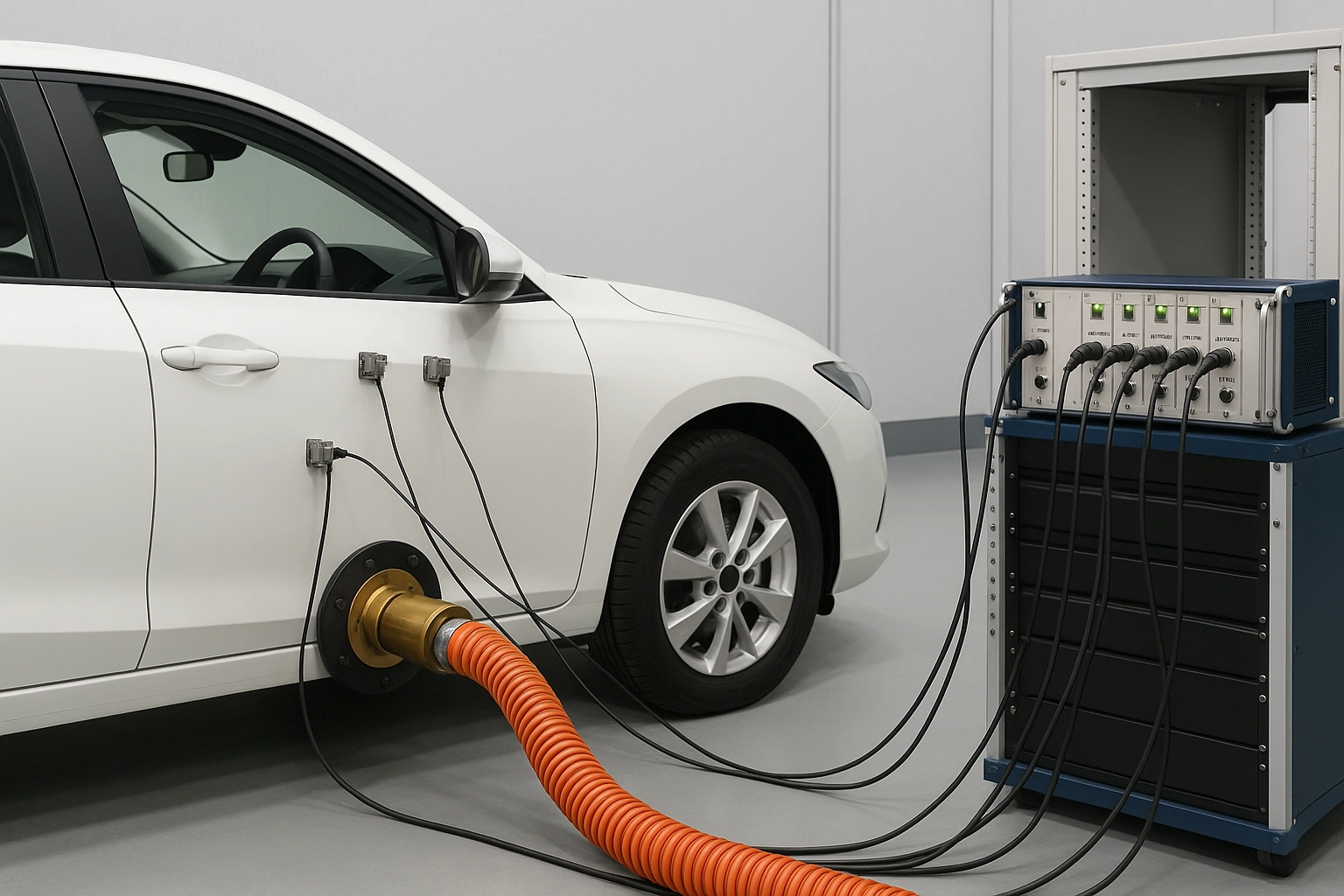DIN 53435 Plastics Vibration Durability NVH Test
The DIN 53435 vibration durability test is a critical procedure used to evaluate the long-term performance of plastics under dynamic loading conditions. This test is particularly important in the automotive sector, where materials must withstand harsh environmental and operational conditions without degradation.
Plastics are widely utilized in automotive components due to their lightweight properties, chemical resistance, and design flexibility. However, they can be susceptible to wear and tear when subjected to vibration over extended periods. The DIN 53435 test provides a standardized method to assess the durability of these materials by subjecting them to controlled cyclic loading conditions that mimic real-world vehicle usage.
The primary goal of this test is to determine the fatigue life of plastics under specified environmental and mechanical stresses, ensuring they meet the stringent quality standards required for automotive applications. This includes evaluating factors such as crack propagation, dimensional stability, and overall material integrity after prolonged exposure to vibration.
During the testing process, specimens are subjected to a series of cyclic loading cycles in accordance with DIN 53435 guidelines. The test setup typically involves a shaker or vibration table that applies controlled frequency and amplitude vibrations to the specimen. The duration of these tests can range from several hours to days, depending on the desired fatigue life assessment.
Post-testing analysis focuses on examining any signs of damage or failure within the specimens. Common indicators include visual cracks, changes in coloration, dimensional alterations, and loss of material properties such as tensile strength or impact resistance. Advanced techniques like X-ray imaging, surface profilometry, and mechanical testing are employed to ensure comprehensive evaluation.
The DIN 53435 test is essential for quality assurance and compliance purposes in the automotive industry. Compliance with this standard ensures that manufacturers adhere to international best practices, which can enhance product reliability and consumer safety. Additionally, this test aids R&D engineers in optimizing material selection and design for components exposed to significant mechanical stress.
For procurement teams, ensuring suppliers meet DIN 53435 standards is crucial in maintaining consistent quality across supply chains. By specifying adherence to this standard during the tendering process, organizations can guarantee that their chosen materials will perform reliably under expected operating conditions.
In summary, the DIN 53435 vibration durability test plays a vital role in ensuring the longevity and reliability of plastics used in automotive applications. Its standardized approach provides consistent results across different laboratories, facilitating comparability and trust within the industry.
Scope and Methodology
The scope of the DIN 53435 test encompasses a detailed examination of plastic materials under controlled vibration conditions to assess their durability. This includes evaluating various aspects such as fatigue life, crack propagation, dimensional stability, and overall material integrity.
The methodology involves subjecting specimens to cyclic loading cycles using a shaker or vibration table. The frequency and amplitude of the vibrations are precisely controlled according to predefined parameters outlined in DIN 53435. These parameters ensure that the test conditions accurately reflect real-world automotive usage scenarios.
Post-testing analysis is conducted through visual inspection, mechanical testing, and advanced imaging techniques such as X-ray and surface profilometry. This comprehensive evaluation provides insights into any potential damage or failure mechanisms within the specimens.
The DIN 53435 test serves multiple purposes in the automotive industry, including:
- Evaluating fatigue life under specified conditions
- Identifying crack propagation patterns and their progression over time
- Determining dimensional stability of plastic components
- Assessing changes in material properties such as tensile strength and impact resistance
This standardized approach ensures that all participants adhere to consistent testing procedures, leading to reliable and comparable results.
Eurolab Advantages
EuroLab offers unparalleled expertise in conducting DIN 53435 tests with precision and accuracy. Our state-of-the-art facilities are equipped with the latest technology, ensuring that we can provide reliable data for your testing needs.
- Accurate Testing: Using advanced vibration tables and shakers allows us to replicate real-world conditions accurately.
- Compliance Verification: Our experienced team ensures that all tests adhere strictly to DIN 53435 standards, providing you with peace of mind regarding compliance.
- Expertise in Automotive Applications: Our engineers have extensive experience working within the automotive sector, allowing us to tailor our services to meet specific requirements.
- Comprehensive Reporting: We provide detailed reports that not only summarize test results but also offer valuable insights into potential areas for improvement.
- Fast Turnaround Times: Leveraging our efficient processes and skilled personnel, we can deliver timely results without compromising quality.
- Supportive Consultation: Our team is available to assist you throughout the testing process, offering guidance on best practices and interpreting findings effectively.
Choosing EuroLab for your DIN 53435 tests means partnering with a reputable institution that values precision, reliability, and customer satisfaction. We strive to exceed expectations by providing high-quality services tailored specifically to your unique needs.
Quality and Reliability Assurance
EuroLab is committed to maintaining the highest standards of quality and reliability in all our testing processes. Our commitment extends beyond mere compliance; we aim to deliver exceptional results that exceed expectations.
- ISO/IEC 17025 Accreditation: We maintain ISO/IEC 17025 accreditation, ensuring our facilities meet international quality standards. This accreditation guarantees the accuracy and precision of our test results.
- Advanced Laboratory Equipment: Our state-of-the-art equipment is regularly calibrated to ensure consistent performance and accurate measurements.
- Experienced Professionals: Our team comprises highly skilled professionals with extensive experience in performing DIN 53435 tests. They bring a wealth of knowledge and expertise to every project, ensuring optimal outcomes.
- Continuous Quality Improvement: We continuously strive for improvement by adopting new technologies and methodologies while staying abreast of industry trends and best practices.
- Client Satisfaction Focus: At EuroLab, we prioritize client satisfaction. Our focus on delivering accurate results within specified timelines ensures that your projects remain on track.
By choosing EuroLab for your DIN 53435 tests, you can rest assured knowing that you are working with a partner dedicated to excellence in every aspect of our operations.





